Poké Ball
| This article is a featured article. This means that it has been identified as one of the best articles produced on Bulbapedia. |
A Poké Ball (Japanese: モンスターボール Monster Ball) is a type of item critical in any trainer's quest. It is used for capturing and storing wild Pokémon; a trainer may carry as many Poké Balls and ball variants as they desire. However, a trainer may only carry up to 6 Pokémon at a time in their party. Therefore, if a trainer owns more than 6 Pokémon, they may be stored in a Pokémon storage system, and withdrawn or deposited at any Pokémon Center. There are 4 different basic levels of Poké Ball, and over a dozen variations on the Poké Ball design throughout the games.
A Poké Ball's strength is determined by how much it raises a wild Pokémon's catch rate. Many Poké Balls' strengths change based on certain conditions.
Mechanics
Though the technology behind the workings of a Poké Ball remains unknown, the basic mechanics are fairly simple to understand. In a battle, once the opposing wild Pokémon has been weakened, the trainer will throw a Poké Ball at it. Assuming the Poké Ball hits it and is not dodged or hit back to the trainer, the Poké Ball will open, convert the wild Pokémon to an energy form, pull the energy into its hollow center, and then close. The wild Pokémon will then be given the chance to struggle to try and escape the Poké Ball. If it escapes, in the anime, the Poké Ball flies back towards the trainer, while in the games, the Poké Ball bursts open and cannot be reused. If it does not escape, the wild Pokémon will be captured.
As seen in anime episodes like Gulpin it Down! and Claydol Big and Tall, normal Poké Balls have difficulty capturing extremely large and heavy Pokémon, to the point that the Pokémon will not even be taken entirely into the Poké Ball. The latter of these episodes shows how ancient civilizations overcame this issue: to capture and hold a very large Pokémon, they constructed a very large Poké Ball out of stone. However, giant stone Poké Balls are nearly impossible to use, so with the advancement of technology a better solution came in the form of Heavy Balls.
Besides capturing new Pokémon, Poké Balls are also used to store captured Pokémon. A trainer can have six Poké Balls with Pokémon in them at one time. When starting a battle, he can throw out one or more of these onto the battlefield, and they will open, releasing their Pokémon quickly. When a trainer wants to recall their Pokémon, they simply hold up the Poké Ball and point it at their Pokémon, and a beam will come from the Poké Ball's button, converting the Pokémon into energy again and drawing it back in. Also, some Pokémon know how to enter and leave their Poké Balls at will.
Poké Balls are not always at full size. Tapping the button on the front can convert it from full size, about the same size as a baseball, to a miniature size, about the same size as a ping-pong ball. This smaller size is more useful for storage, being small enough to carry in pockets or on belts.
Poké Balls presumably can communicate with a trainer's Pokédex, since the system updates itself with new captured Pokémon information, and keeps track of how many full Poké Balls the trainer has on-hand. If the trainer catches a new Pokémon while their team of six is full, it will be transported to the Pokémon storage system they are using.
When a Pokémon is released from its ball, it usually has a burst of light come out with it. However, when a Ball Capsule and seals are used, visual effects will accompany the Pokémon's release. It has also been shown that if a Pokémon is sent out with a blue light, that Pokémon will be released and will be able to go back into the wild.
Types of Poké Ball
Generation I Poké Balls
In the games
| Image | Name | Catch rate | Buy | Sell | ||
|---|---|---|---|---|---|---|

|
File:PokeBallSpriteSmall.png Poké Ball (モンスターボール Monster Ball) |
1× | $200 | $100 | ||
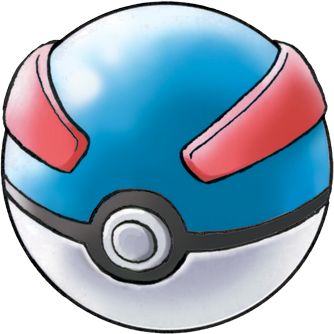
|
File:GreatBallSpriteSmall.png Great Ball (スーパーボール Super Ball) |
1.5× | $600 | $300 | ||
| File:SafariBallSpriteSmall.png Safari Ball (サファリボール Safari Ball) |
1.5× | - | - | |||

|
File:UltraBallSpriteSmall.png Ultra Ball (ハイパーボール Hyper Ball) |
2× | $1200 | $600 | ||
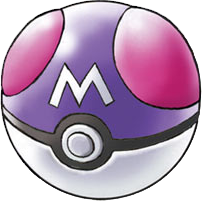
|
File:MasterBallSpriteSmall.png Master Ball (マスターボール Master Ball) |
255x1 | - | $0 | ||
|
| ||||||
These Poké Balls were first introduced in Generation I and have appeared in each game since, with the exception of the Safari Ball which did not appear in the second Generation of games.
The Poké Ball is considered the most basic and universal form of Ball. Nearly every Poké Mart carries it or one of its two upgrades, the Great Ball and Ultra Ball. The only known place where these three Balls are not plentiful is Orre, due to its lack of wild Pokémon. With the discovery of PokéSpots, however, they are becoming more commonly available in this region as well.
The Master Ball is the final and best upgrade of the Poké Ball, as well as the most rare. It was developed by Silph Co., but only a few were created before Team Rocket invaded and the project was discontinued. Master Balls are now given only to esteemed Pokémon researchers. Because of this, only one can be found normally in each game (though it can be won in all other generations after the first; it is the grand prize for the Lucky Number show, Lilycove City's Lottery, and at Jubilife TV, respectively). It could be sold for $0 in Generation II, but in later Generations the Poké Marts would refuse it.
The Safari Ball is the only one of the original Poké Ball forms that is not considered one of the basic Poké Ball types. When playing a game in the Safari Zone, thirty of these will be provided to capture Pokémon with. If the game ends before all thirty are used, the remainder are returned when leaving the Safari Zone. It is as strong as a Great Ball, but catching Pokémon is often more difficult with it due to the fact that there are no formal battles with Pokémon in the Safari Zone.
Super Smash Bros.
Normal Poké Balls are also an item in the Super Smash Bros. series. When thrown, on top of doing a small amount of damage to any opposing character they may hit, they release a randomly selected Pokémon.
Super Smash Bros. Melee Trophy information
These balls are used to capture and contain wild Pokémon. Most Pokémon must be weakened in some way before they can be captured, but once they're inside a Poké Ball, they enjoy their new home, since Poké Balls contain an environment specially designed for Pokémon comfort. Master Balls are the strongest type.
In the anime
Beyond any doubt, the original Poké Ball is the most commonly used type of Ball in the anime. The vast majority of Pokémon are stored in regular Poké Balls, to the point that large collections of Poké Balls can be seen with no variations among them. Even Ash's Pikachu, which spends all of its time out of its Poké Ball, is shown to have a regular Poké Ball with a little lightning bolt drawn on it in Pokémon, I Choose You!. On the other hand, the Great Ball and Ultra Ball upgrades are very rare.
A Master Ball has been seen in Whiscash and Ash. It was used by Sullivan in his attempt to capture a Whiscash. However, despite the fact that the Master Ball cannot be escaped from, he did not catch the Whiscash; instead, the Pokémon swallowed it whole and escaped back into the water.
Safari Balls were seen in The Legend of Dratini. In this episode, Ash received thirty with which he could capture Safari Zone Pokémon. However, despite his best efforts to catch other Pokémon, he ended up using all thirty to capture a herd of Tauros.
Occasionally, an item will be caught instead of a Pokémon, such as a jelly donut or something else that would be smaller than the Poké Ball. These, however, are just jokes. In a commercial for Kids WB, Ash caught a talking sock singing that Ash couldn't catch him.
Generation II Poké Balls
In the games
| Name | From | Catch rate | Sell | |||
|---|---|---|---|---|---|---|
| Park Ball (パークボール Park Ball) |
- | 1.5× | - | |||
| Level Ball (レベルボール Level Ball) |
Red | If the player's current Pokémon's level is:
|
$500 | |||
| Lure Ball (ルアーボール Lure Ball) |
Blu | If wild Pokémon was hooked on a rod, 3×. | $500 | |||
| Moon Ball (ムーンボール Moon Ball) |
Ylw | If wild Pokémon evolves with a Moon Stone, 4×. | $500 | |||
| Friend Ball2 (フレンドボール Friend Ball) |
Grn | 1× | $500 | |||
| Fast Ball (スピードボール Speed Ball) |
Wht | If wild Pokémon is one that flees from battles3, 4×. | $500 | |||
| Heavy Ball (ヘビーボール Heavy Ball) |
Blk | If the wild Pokémon is:
|
$500 | |||
| Love Ball (ラブラブボール Love Love Ball) |
Pnk | If the player's current Pokémon and the wild Pokémon are opposite genders, 8× |
$500 | |||
|
| ||||||
The Park Ball is much like the Safari Ball absent in the Generation II games, including being equal to a Great Ball in strength. It is used in the National Park during their Bug-Catching Contest. Thirty Park Balls are provided for this, and the Pokémon can be battled before they are captured. However, while all thirty balls can be used and catch Pokémon before the contest ends, only one Pokémon can be kept for the contest judging.
Most of the Poké Balls available in Generation II, however, are the custom Poké Balls crafted by Kurt. This Poké Ball expert can be found in Azalea Town, and once per day he will craft an Apricorn into a special Poké Ball based on its color. Because of the much larger variety of Poké Balls available, Generation II was the first generation to introduce a bag with a separate pocket for Poké Balls.
In the anime
In The Bug Stops Here, Ash and Casey compete in the Bug-Catching Contest and use Park Balls to capture Bug Pokémon. Ash wins the contest with a Beedrill, but gives it to Casey instead.
The custom Apricorn Poké Balls were seen and used a few times during the anime. In Goin' Apricorn, Ash, Misty, and Brock receive Fast Balls from Kurt, and by the end of the episode Brock uses his to capture a Pineco. By the end of the next episode, Gettin' The Bugs Out, Ash and Misty receive Lure Balls, and Brock receives a Heavy Ball. In The Totodile Duel, both Ash and Misty tried to capture a Totodile with their Lure Balls, with Ash succeeding. Later, in A Corsola Caper, Misty got a second chance to use her Lure Ball, capturing a Corsola with it. The other two Fast Balls and the Heavy Ball were not seen or mentioned again, but a different Heavy Ball was used in Gulpin It Down! to capture a giant Gulpin.
Generation III Poké Balls
In the games
| Image | Name | Catch rate | Buy | Sell |
|---|---|---|---|---|

|
File:LuxuryBallSpriteSmall.png Luxury Ball (ゴージャスボール Gorgeous Ball) |
1× | - | $500 |
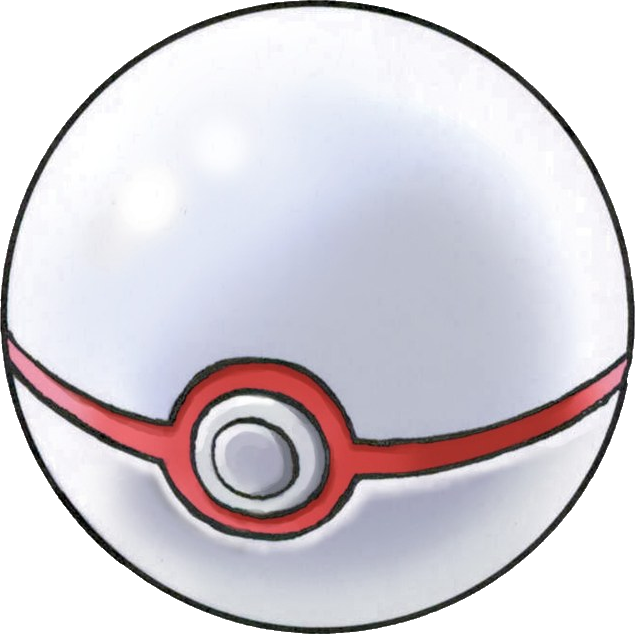
|
File:PremierBallSpriteSmall.png Premier Ball (プレミアボール Premier Ball) |
1× | - | $100 |

|
File:NetBallSpriteSmall.png Net Ball (ネットボール Net Ball) |
If wild Pokémon is a Template:Type2 or Template:Type2, 3×. | $1000 | $500 |

|
File:DiveBallSpriteSmall.png Dive Ball (ダイブボール Dive Ball) |
If battling underwater, 3.5×. | $1000 | $500 |

|
File:NestBallSpriteSmall.png Nest Ball (ネストボール Nest Ball) |
If the wild Pokémon is:
|
$1000 | $500 |
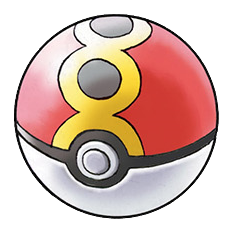
|
File:RepeatBallSpriteSmall.png Repeat Ball (リピートボール Repeat Ball) |
If one of the wild Pokémon's species has been caught before, 3×. |
$1000 | $500 |

|
File:TimerBallSpriteSmall.png Timer Ball (タイマーボール Timer Ball) |
If the number of turns that have passed is:
|
$1000 | $500 |
All of the third generation Poké Balls were developed by the Devon Corporation.
The Luxury Ball is rare, second only to the Master Ball. One can be found on the Abandoned Ship, and others can be obtained from winning Pokémon Contests. It is also given by Lady Selphy for showing her the Pokémon she asks for. It heightens the rate at which the Happiness of the Pokémon captured with it increases.
The Premier Ball is given with every purchase of ten Poké Balls in Hoenn Poké Marts (or Kanto Poké Marts in Pokémon FireRed and LeafGreen) . However, it is not different from regular Poké Balls in any manner except appearance.
The Net Ball and Dive Ball can only be purchased at the Poké Mart in Mossdeep City. This is likely due to the city's high affiliation with the Water type.
The Nest Ball can only be purchased at the Poké Mart in Verdanturf Town.
The Repeat Ball and Timer Ball can be purchased in Rustboro City after going through Rusturf Tunnel from Verdanturf Town for the first time.
All Poké Balls released in Generation I are available as well.
In the anime
The Luxury Ball and the Repeat Ball made a short cameo appearance in the beginning of Jirachi: Wish Maker, containing Brendan's Aggron and Shiftry.
Generation IV Poké Balls
In the games
Five new Poké Balls were introduced in the Generation IV games.
| Image | Name | Catch Rate |
|---|---|---|
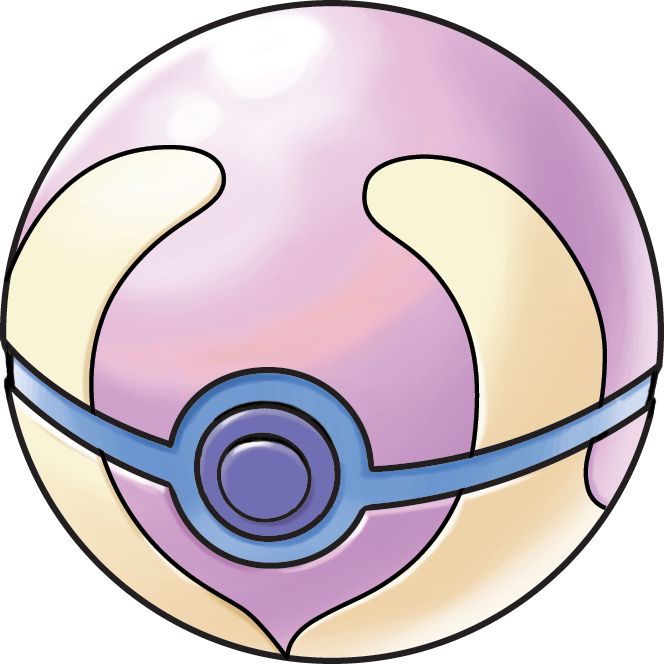
|
File:HealthballDP.png Heal Ball (ヒールボール Heal Ball) | 1x; fully heals a captured Pokémon. |

|
File:DuskballDP.png Dusk Ball (ダークボール Dark Ball) | If within a dark area or during the night, 4x |

|
File:CherishballDP.png Cherish Ball (プレジャスボール Precious Ball) | 1x |

|
File:QuickballDP.png Quick Ball (クイックボール Quick Ball) | Starts at 4x, and for every 5 turns in battle, the capture rate decreases by 1x. |
| Park Ball (パークボール Park Ball) | 100% capture rate. Pal Park only. |
All of the Generation I and Generation III Poké Balls are also available, though the Dive Ball can only be obtained randomly through the man in Solaceon Town upon showing him the Pokémon he asks for, or transferred ahead held by a Pokémon through Pal Park. This is due to a lack of use for it in Sinnoh. Also, for the first time, a Ball was redesigned; that is, the Safari Ball was given a new camouflage pattern. The Park Ball is colored gold and silver, with a light blue center. The Cherish Ball cannot be acquired for use; instead, they contain Pokémon distributed at events.
In the manga
In Pokémon Special manga, one can see the miniature of the Pokémon inside the Poké Ball; the type of ball doesn't matter. In the Electric Tale of Pikachu manga, however, the center of a Poké Ball has a small number to differentiate it from others.
Other Poké Balls
These Poké Balls are found outside of the standard games. They are often too unusual to fit in with other groups of Poké Balls, and some are so unusual that it is questionable if they even qualify as Poké Balls. Most of these have separate articles, which describe their unique properties in greater detail.
In the games
- Pester Balls
- Seen in Pokémon Snap, this unusual Poké Ball cannot catch Pokémon. Instead, it releases an irritating gas.
- GS Ball
- Seen in Pokémon Crystal, this Poké Ball cannot catch Pokémon. Instead, it is a special item that can be used to make Celebi appear in the Ilex Forest.
- Snag Balls
- Though not a Poké Ball in its own right, this is seen in Pokémon Colosseum and Pokémon XD: Gale of Darkness. It is a ball that has been modified using the Snag Machine. It is capable of snagging a captured Pokémon during a Pokémon battle as if it were wild.
In the anime
- Pre-Poké Ball Objects
- There are multiple artifacts and antiques which have similar properties to modern Poké Balls but are not technically the same thing - some, in fact, are not even balls. These range from unusual artifacts found in the ancient city of Pokémopolis which contain Giant Pokémon inside (seen in The Ancient Puzzle of Pokémopolis) to antique Poké Balls which look similar to their modern-day equivalents but have an altered design and are made from a more fragile material (seen in Just Waiting on a Friend). Given that these were made before the development of the technology used in modern Poké Balls, the workings behind these objects are a mystery. Another early Poké Ball design is seen in Pokémon 4Ever when Sammy uses a Poké Ball brought from his own time with a lock on its button to call out his Charmeleon. This model seems to be much closer to the modern design.
- Green Poké Balls
- Official name unknown. In Pokémon, I Choose You!, in the Pokémon League battle seen at the very start of the episode, one trainer, assumably Bruno, throws out a green Poké Ball which contains an Onix. This was the first Poké Ball seen in the anime. No details on this Poké Ball were given, and its color has never been explained; shortly after in the episode, regular red Poké Balls are used.
- It is possibly supposed to be some special sort of Poké Ball, like a Great Ball or Ultra Ball, to help show the elite status of the trainers battling. Additionally, since some Generation II information was known at this point, it could be an early assumption of one of the apricorn balls. If this were the case, then it would be most likely a Friend Ball. It's also very similar to a Safari Ball anime design, except it doesn't have an "S" letter.
- Solid Gold Poké Balls
- There are not actually any solid gold Poké Balls in the Pokémon world. However, the idea is often used to fool greedy criminals like Brodie in The Ribbon Cup Caper or gullible consumers like James in Battle Aboard the St. Anne.
- Mewtwo's Poké Balls
- Official name unknown. Marked by an eerie eye incorporated into their design, these Poké Balls were created and used by Mewtwo in Mewtwo Strikes Back. They can be moved around easily with Mewtwo's Psychic powers, and they can capture any Pokémon, including those which are already inside other Poké Balls. Mewtwo used these to gather Pokémon to be cloned.
- GS Ball
- This was in the possession of Professor Ivy, who gave it to Ash, who in turn gave it to Kurt to study. Despite this, its purpose is completely unknown, since it was never mentioned again after being given to Kurt, and has most likely been forgotten. There is a large amount of fan speculation as to what purpose it holds.
- Lake Balls
- These balls were used only in the Seaking Catching Competition, similar to the Park Balls used in the Bug-Catching Contest. They only appeared in Hook, Line, and Stinker, and have not been seen since. They appear as blue and white Poké Balls, with a fish pattern around the edge, and a yellow arrow on the top and bottom of the ball.
- Dark Balls
- These were used by The Iron Masked Marauder in Pokémon 4Ever. Presumably technology of Team Rocket, these Poké Balls will take over the mind of any Pokémon caught by them, making them turn into mindless servants of whoever caught them. These were used to capture multiple Pokémon, including Celebi.
- Crystal Poké Balls
- These were created by the Unown for Molly to battle with during Spell of the Unown.
- Rocket Poké Balls
- These were used in Mewtwo Returns, and look like normal Poké Balls but black with a red "R" on them. Hundreds were used by the many Rockets in the special.
- Chansey Poké Balls
- Used by a Nurse Joy in Showdown at Dark City.
In the TCG
- Dual Ball
- This ball is found in Expedition, EX Team Magma vs Team Aqua, EX Delta Species, and EX Crystal Guardians.
- Team Aqua Ball
- This ball is found in EX Team Magma vs Team Aqua.
- Team Magma Ball
- This ball is found in EX Team Magma vs Team Aqua.
- Rocket's Poké Ball
- This ball is found in EX Team Rocket Returns.
References
- Fritz, Chris. Pokémon Forever GBA Poké Ball information.

|
This item article is part of Project ItemDex, a Bulbapedia project that aims to write comprehensive articles on all items. |